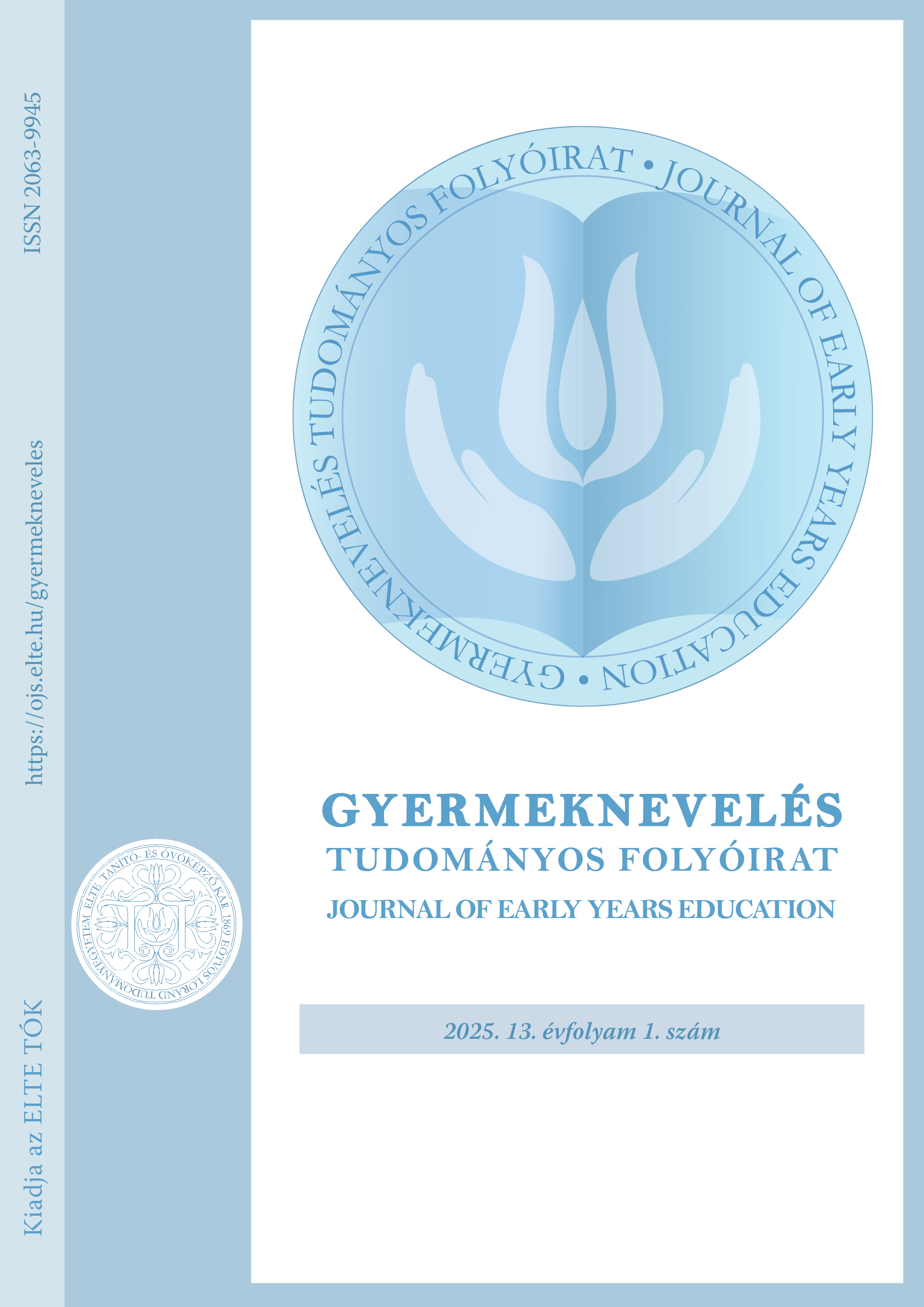Supporting Preschool Teachers and Candidates in Inclusive Preschool Setting – Presentation of Naturalistic Teaching Project
DOI:
https://doi.org/10.31074/gyntf.2025.1.20.28Kulcsszavak:
preschool, inclusion, Naturalistic Teaching, interactions, developmentAbsztrakt
Although mainstream teachers have wide knowledge about children with special educational needs (SEN), improvement of practical skills regarding education and development of these children is always needed. Improving teaching skills related inclusion and best practices are very important, as well as exchanging inclusion-related information and experience with other countries. Naturalistic teaching is defined as a process that helps children to gain developmental goals through interactions with the teacher embedded in natural environment and situations. It is a process, which provides developmental opportunities for all young children with SEN at-risk groups and with typical development to acquire skills or reinforce them. This paper presents the characteristics of Naturalistic Teaching as well as the key elements of it. The main questions and strategies are also described such as strategies that can be used with both children with and without SEN. Naturalistic Teaching Project is also presented as a good example of international information changing in the field of preschool inclusion.
Letöltések
Hivatkozások
Ainscow, M., Dyson, A., & Weiner, S. (2013). From Exclusion to Inclusion: Ways of Responding in Schools to Students with Special Educational Needs. CfBT Education Trust.
Avramidis, E., & Norwich, B. (2002). Teachers’ attitudes towards integration/inclusion: a review of the literature. European journal of special needs education, 17(2), 129–147. https://doi.org/10.1080/08856250210129056
Bryant, J. P. (2018). A phenomenological study of preschool teachers’ experiences and perspectives on inclusion practices. Cogent Education, 5(1), 1549005. https://doi.org/10.1080/2331186X.2018.1549005
Böddi, Z., Serfőző, M., Lassú, Z. F., & Kerekes, V. (2019). Integration-related experience and preparedness from the aspect of Hungarian preschool teacher candidates. International Journal of Early Childhood Special Education, 11(1), 80–91. https://doi.org/10.20489/intjecse.587251
Böddi, Zs. (2020). Az inkluzív óvodai nevelés sajátosságai és tényezői. In Endrődy, O., Svraka, B. & F. Lassú, Zs. SOKSZÍNŰ PEDAGÓGIA Inkluzív és multikulturális szemléletmód a pedagógiai gyakorlatban (pp. 244–269). ELTE Eötvös Kiadó. https://www.eltereader.hu/media/2020/10/Endr%C5%91dy-%E2%80%93-Svraka-%E2%80%93-F-Lass%C3%BA-Soksz%C3%ADn%C5%B1-pedag%C3%B3gia-WEB.pdf
Rakap, S., Cig, O., & Parlak-Rakap, A. (2017). Preparing preschool teacher candidates for inclusion: Impact of two special education courses on their perspectives. Journal of Research in Special Educational Needs, 17(2), 98–109. https://doi.org/10.1111/1471-3802.12116
European Agency for Special Needs and Inclusive Education, 2017. Inclusive Early Childhood Education: New Insights and Tools – Contributions from a European Study. (M. Kyriazopoulou, P. Bartolo, E. Björck-Åkesson, C. Giné & F. Bellour (Eds.), Odense, Denmark. ISBN: 978-87-7110-634-3 Retrieved from: https://www.european-agency.org/
Ferguson, D. L. (2008). International trends in inclusive education: The continuing challenge to teach each one and everyone. European Journal of special needs education, 23(2), 109–120. https://doi.org/10.1080/08856250801946236
Frankel, E. B., Gold, S., & Ajodhia-Andrews, A. (2010). International preschool inclusion: Bridging the gap between vision and practices. Young exceptional children, 13(5), 2–16. https://doi.org/10.1177/1096250610379
Ginner Hau, H., Selenius, H., & Björck Åkesson, E. (2022). A preschool for all children?–Swedish preschool teachers’ perspective on inclusion. International journal of inclusive education, 26(10), 973–991. https://doi.org/10.1080/13603116.2020.1758805
Hastings, R. P., & Oakford, S. (2003). Student teachers’ attitudes towards the inclusion of children with special needs. Educational psychology, 23(1), 87–94. https://doi.org/10.1080/01443410303223
Kwon, K. A., Hong, S. Y., & Jeon, H. J. (2017). Classroom readiness for successful inclusion: Teacher factors and preschool children’s experience with and attitudes toward peers with disabilities. Journal of Research in Childhood Education, 31(3), 360–378. https://doi.org/10.1080/02568543.2017.1309480
Lundqvist, J. (2023). Putting preschool inclusion into practice: a case study. European Journal of Special Needs Education, 38(1), 95–109. https://doi.org/10.1080/08856257.2022.2031096
Miesera, S., DeVries, J. M., Jungjohann, J., & Gebhardt, M. (2019). Correlation between attitudes, concerns, self-efficacy and teaching intentions in inclusive education evidence from German pre-service teachers using international scales. Journal of Research in Special Educational Needs, 19(2), 103–114. https://doi.org/10.1111/1471-3802.12432
Seçer, Z. (2010). An analysis of the effects of in-service teacher training on Turkish preschool teachers’ attitudes towards inclusion. International Journal of Early Years Education, 18(1), 43-53. https://doi.org/10.1080/09669761003693959
Snyder, P. A., Rakap, S., Hemmeter, M. L., McLaughlin, T. W., Sandall, S., & McLean, M. E. (2015). Naturalistic instructional approaches in early learning: A systematic review. Journal of Early Intervention, 37(1), 69–97. https://doi.org/10.1177/1053815115595461
https://www.naturalisticteaching.com/en
https://www.naturalisticteaching.com/module-book/6-module-1-naturalistic-teaching-process
https://www.naturalisticteaching.com/module-book/2-module-3-responsive-adult-behaviors
##submission.downloads##
Megjelent
Hogyan kell idézni
Folyóiratszám
Rovat
License
Copyright (c) 2025 Szerző

This work is licensed under a Creative Commons Attribution-NonCommercial-ShareAlike 4.0 International License.

